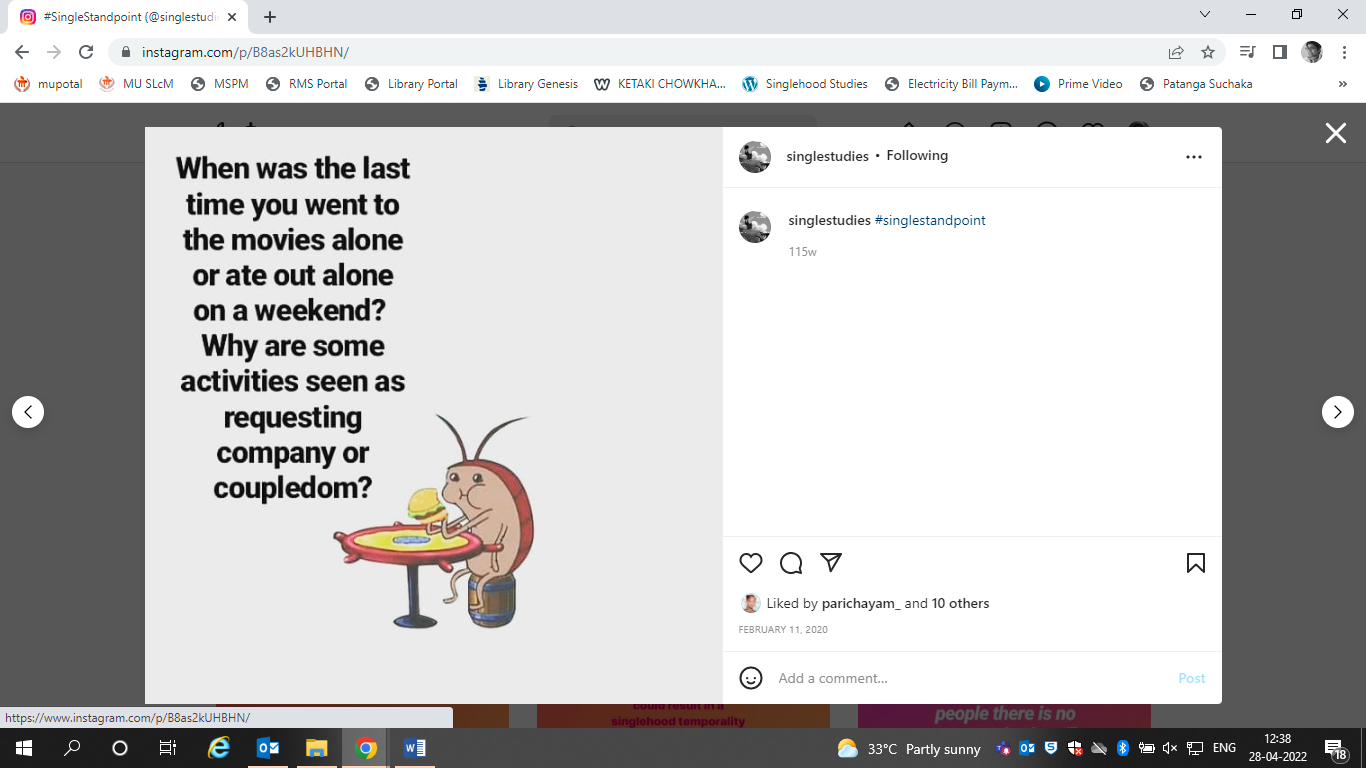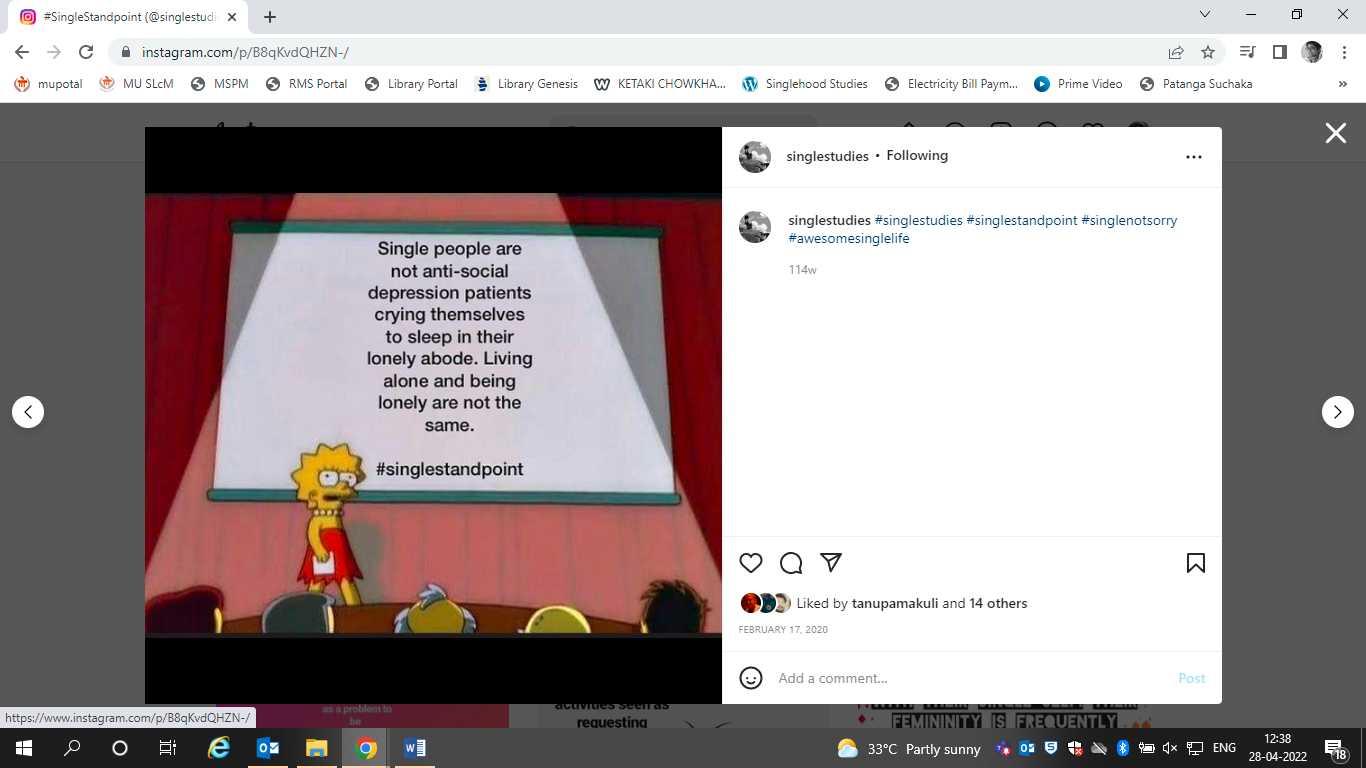|
While I wouldn’t go as far as to say I’m grateful for the pandemic, there are some good things that have emanated from it, namely Zoom conference. While I do prefer the Brigadoon-like feel of the in-person conference (being in a world of people interested in what I do), Zoom has given me a chance to connect with scholars in Singles Studies, many of whom are based globally. NeMLA was fun and insightful, and I always learn from the Popular Culture Association and Conference on College Composition and Communication (CCCC), but with Singles Studies, the work reaches beyond the intellectual and hits me emotionally. Ketaki Chowkhani and I have developed a wonderful connection through our work, which led to the International Singles Studies Conference, and through that, I’ve developed another friendship with Elizabeth Foulke. There have also been Zoom chats with Elyakim Kislev, and Bella DePaulo even spoke to one of my classes last year about her work in Singles Studies. This might have still happened with Skype, but the pandemic has amplified the opportunity for this remote conversations. Such a remote conversation occurred on May 3, 2022. I usually rise at about 7, but since this talk was being offered by the University of Cambridge at noon, my alarm went off at 5:30, to which I said, “Okay, I’m up!” After making breakfast and coffee, I logged onto the platform. Ketaki and I have been working on our Singles Studies collection, so we each presented part of the introduction, which essentially defines the oppressive problems of singlism and matrimania, delineates some of the key players who’ve brought these issues to light, and discusses how our collaboration (and subsequent conference and collection) came to be. We also presented work from our courses in Singles Studies. I shared the various activities my students engage in so they can be comfortable with their singlehood, whether it be for now or forever (dining solo, analyzing popular culture elements for singlist messages). Ketaki’s syllabus fascinated me when I first read it; students examine and discuss a number of seminal works from our field (i.e.,; Singled Out, Happy Singlehood, Table for One) and some lesser-known, though no less important, pieces (“Death by Stereotype,” “Single But Not Alone”). The memes her students created on the class’ Instagram page were fantastic as well: Katherine Fama’s talk about singles studies scholarship hiding in a range of places, such as fiction, in which there are both explicit and implicit celebrations and expressions of and advocacy for single lives waiting to be recovered and included. I was delighted to see a full schedule for a conference called “Single Lives: 200 Years of Independent Woman in Literature and Popular Culture,” which was just that: a conference devoted to legitimizing single women in our media. Scholars from all over the world presented (including from the University of Texas at El Paso, my alma mater), and now that virtual conferences have become normalized, I’m hoping for more of these international gatherings.
The discussion portion brought some great questions, including one from Elizabeth on singlehood as viewed the lenses of religious institutions, whether widowhood qualifies as “being single,” portrayals of single television characters, and whether a married woman who regularly does things alone qualifies as single. Here are some of my thoughts: Religion – Steph Penny writes regularly about this topic, and Ketaki cited Single Friendly Church, a group striving to help churches become more inclusive of singles. Widowhood – I would say “yes,” as many widows and widowers struggle to adjust to single life after their partners pass. This is why everyone should practice being alone, because at some point, even in the best of marriages, one spouse will pass, and the other will have to adapt. Conversely, widowhood is also seen as the only acceptable type of singlehood, given the stigma attached to divorce and having never married. TV characters – Katherine said it all here; while singlehood isn’t portrayed as negatively on TV as it used to be, we still have some work to do. Even Sex and the City, edgy as it was at the time, ended with all four characters coupling up. Married women doing things alone – This woman might fall under the category of what DePaulo would define as “single at heart.” This woman might live her best life as a single person; she just happens to be partnered. Another random thought that occurred was the abundance of scholarship occurring in the Eastern Hemisphere. And I realized that while many of us advocate with fury in the US, it’s even more pronounced in India. Ketaki introduced me to Bachelor Girls, a horrifying documentary about the inhumane treatment of single woman trying to found housing in Mumbai. In India, marriage is such a centralized part of life that when rebellion occurs, it comes like fire. And I feel it coming from scholars like my friend Ketaki, as well as Saumya Sharma. And I love that heat. The panel ended at 8:30, which is usually the time I’m getting out of the shower. While I was still tired, I felt the same degree of sadness I did when our Singles Studies: Global Perspectives conference ended. I spent hours connecting with people I’m connected to beyond the surface level, and once it ends, I’m back in the world. But I’m more determined to do my part for the cause afterwards. And Chester was waiting for me too, as he nudged me toward the couch for a power nap. I followed his order, and this reward was definitely earned. Thank you, Reetika, for organizing and facilitating, and a special thanks to Ketaki for thinking of me.
0 Comments
Leave a Reply. |
AuthorMy name is Craig. I'm an educator, writer, and unapologetic singleton. When not reading, writing, or teaching, I enjoy hiking, running, watching movies, going to concerts, spending time with friends, and playing with my cat/son, Chester. Archives
July 2024
Categories |


 RSS Feed
RSS Feed
